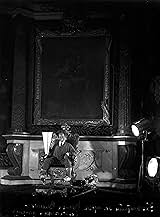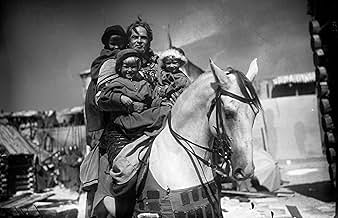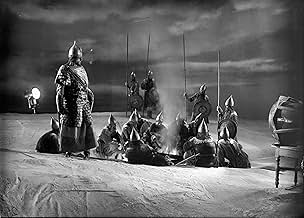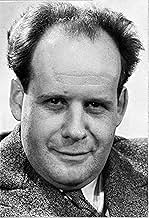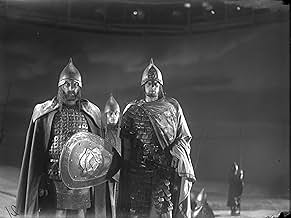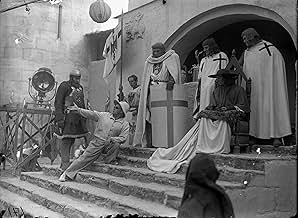VALUTAZIONE IMDb
7,5/10
12.780
LA TUA VALUTAZIONE
La storia di come un grande principe russo guidò un esercito disordinato per combattere una forza d'invasione di Cavalieri Teutonici.La storia di come un grande principe russo guidò un esercito disordinato per combattere una forza d'invasione di Cavalieri Teutonici.La storia di come un grande principe russo guidò un esercito disordinato per combattere una forza d'invasione di Cavalieri Teutonici.
- Regia
- Sceneggiatura
- Star
- Premi
- 2 vittorie totali
Nikolay Cherkasov
- Aleksandr Nevsky
- (as N. Cherkasov)
Nikolai Okhlopkov
- Vasili Buslai
- (as N. Okhlopkov)
Andrei Abrikosov
- Gavrilo Oleksich
- (as A. Abrikosov)
Dmitriy Orlov
- Ignat - the Master Armorer
- (as D. Orlov)
Vasili Novikov
- Pavsha - Governor of Pskov
- (as V. Novikov)
Nikolai Arsky
- Domash Tverdislavich - a Novgorod Boyar
- (as N. Arsky)
Varvara Massalitinova
- Amelfa Timoferevna - Buslai's Mother
- (as V. Massalitova)
Valentina Ivashova
- Olga Danilovna - a Maid of Novgorod
- (as V. Ivashova)
Aleksandra Danilova
- Vasilisa - a Maid of Pskov
- (as A. Danilova)
Sergei Blinnikov
- Tverdilo - Traitorous Mayor of Pskov
- (as S. Blinnikov)
Ivan Lagutin
- Anani - a Monk
- (as I. Lagutin)
Lev Fenin
- The Archbishop
- (as L. Fenin)
Naum Rogozhin
- The Black-Hooded Monk
- (as N. Rogozhin)
Nikolai Aparin
- Mikhalka
- (non citato nei titoli originali)
Boris Belyakov
- Rytsar
- (non citato nei titoli originali)
A. Gulkovski
- Teutonic Knight
- (non citato nei titoli originali)
Avenir Gulkovskiy
- rytsar Tevtonskogo ordena
- (non citato nei titoli originali)
Recensioni in evidenza
In 1242, Russia in being invaded by two sides: from the orient by the Mongols and from Europe side, by the Germans Teutonic Knights of the Holy Roman Empire. The city of Novgorod is the last free city in Russia. The population, in order to organize the defense of Novgorod and the lands of Russia, calls the Prince Aleksandr Nevsky, who had defeated the Swedish in a previous battle. His successful strategy defeats the Germans, after a great battle on a frozen lake. This movie was made in 1938 due to the threaten of the German to Russia, in a pre-Second World War period. The idea was to make propaganda pro-Russia. However, it is an overwhelming, marvelous, stunning powerful masterpiece. It is amazing the combat scene on the frozen lake. The present generation is very accustomed to special effects, like in the `Lord of the Rings' trilogy, and maybe cannot understand how fantastic is this black and white fight. If the viewer can forget the ideology and watch it as an art, he will certainly be astonished in the end with such a masterpiece. My vote is ten.
Title (Brazil): Alexander Nevsky
Title (Brazil): Alexander Nevsky
Like many of Eisenstein's other works, "Aleksandr Nevsky" is a beautifully made and well-written propaganda piece. Even today, it stands on its own with a solid story and incredible action scenes. No one did an epic battle better than Eisenstein ("October" and "Ivan the Terrible"), and the giant battle on the frozen lake in "Nevsky" ranks up there as one of his best.
Just as important to the film as Eisenstein's script and visuals is the masterful score by Prokofiev. Fortunately, it has been rerecorded for the most recent video release and the new soundtrack adds incalcuable depth and power to the story on the screen. In my opinion, the film's score is simply the best ever composed for a film. It fits the film perfectly, both during the film's intense action scenes and the lingering moments of reflection. If for no other reason, one should see this film to hear one of the 20th century's greatest composer's best works.
The story is true (well, as true as events from the 1200s can be accurately recreated) and simple, but powerful. Despite its heavy-handed Russian/Soviet patriotism, the film succeeds in telling a compelling story. When one looks at the events unfolding when the film was made, it becomes even more of a masterpiece.
No, "Nevsky" doesn't have the flashy visuals or super-handsome stars of a modern war epic, but it still ranks of one of the most interesting films in my book. For fans of Eisenstein or classic cinema, it is an absolute must-see. And for people who want to see the Soviet propaganda machine firing on all cylinders, check it out as well.
Just as important to the film as Eisenstein's script and visuals is the masterful score by Prokofiev. Fortunately, it has been rerecorded for the most recent video release and the new soundtrack adds incalcuable depth and power to the story on the screen. In my opinion, the film's score is simply the best ever composed for a film. It fits the film perfectly, both during the film's intense action scenes and the lingering moments of reflection. If for no other reason, one should see this film to hear one of the 20th century's greatest composer's best works.
The story is true (well, as true as events from the 1200s can be accurately recreated) and simple, but powerful. Despite its heavy-handed Russian/Soviet patriotism, the film succeeds in telling a compelling story. When one looks at the events unfolding when the film was made, it becomes even more of a masterpiece.
No, "Nevsky" doesn't have the flashy visuals or super-handsome stars of a modern war epic, but it still ranks of one of the most interesting films in my book. For fans of Eisenstein or classic cinema, it is an absolute must-see. And for people who want to see the Soviet propaganda machine firing on all cylinders, check it out as well.
10ekeby
I've loved this movie since the first time I saw it lo these many years ago. I'm not sure how many times I've seen it, perhaps 10, perhaps 20. This last time I watched it I was struck by a detail that I hadn't noticed before.
Toward the end of the picture, the slain heroes are conveyed back to the town via sled. There are a couple of closeups of the dead men. The one that struck me most was a shot of the blond youth. All you see on the screen is his profile from head to hands. His hands hold a flickering candle. The wind is blowing and his thick blond hair is dancing in the wind, in sync with the flicker of the candle flame. The contrast between death and the life he has lost is incredibly powerful. The moving hair and candle flame remind us of the life force that once inhabited his body.
Every time I revisit this film I see something new.
Toward the end of the picture, the slain heroes are conveyed back to the town via sled. There are a couple of closeups of the dead men. The one that struck me most was a shot of the blond youth. All you see on the screen is his profile from head to hands. His hands hold a flickering candle. The wind is blowing and his thick blond hair is dancing in the wind, in sync with the flicker of the candle flame. The contrast between death and the life he has lost is incredibly powerful. The moving hair and candle flame remind us of the life force that once inhabited his body.
Every time I revisit this film I see something new.
Sergei Eisenstein's "Alexander Nevsky" is a biopic of the famous prince, but when released it was seen as an expression of the growing suspicion of Nazi Germany. Indeed, the battle scenes make the Teutonic Knights - aka the Germans - get depicted as faceless goons who have no qualms about killing anyone. The epic battle scene is probably the most well remembered scene in the movie. It basically says "If you invade Russia, expect the same fate as befell the Teutonic Knights." Hitler didn't heed the warning, and his hoped-for thousand-year Reich only lasted twelve years (the harsh winters didn't help matters).
Understanding that it's a form of propaganda, it's an impressive movie. I wouldn't expect otherwise from Eisenstein. If you're going to teach a course on Russian cinema, you would have to include this one. Excellent movie.
Understanding that it's a form of propaganda, it's an impressive movie. I wouldn't expect otherwise from Eisenstein. If you're going to teach a course on Russian cinema, you would have to include this one. Excellent movie.
Alexander Nevsky (1938) is a brilliant piece of cinematic propaganda. The people of Russia are threatened by two major enemies, the Mongols and the Teutonic Knights of the Holy Roman Empire. In ordered to unite the warring, rival Princes in the Russian Realm, Nevsky takes charge and fights the lesser of two evils (The Teutonics). This influential film was copied many times over and it still holds up to this day. The soundtrack by composer Prokiev and Eisentstein's direction are a sight and sound to behold Many years later, John Milius used many of the movies scenes, set pieces and costumes from this film and incorporated them into Conan.
One of my favorite lines from Conan was taken from this movie. "It's not the strength of the iron in a weapon but the strength of the person that wields it is what matters." The comparisons are unmistakable. The armor that James Earl Jones and the Leader of the Teutonic Knights wear are virtually identical. A true tribute paid from one director to another.
I give Alexander Nevsky one of my highest recommendations. The movie plays like the final Act of Richard III. The presence of Prince Alexander on the screen is truly amazing.
One of my favorite lines from Conan was taken from this movie. "It's not the strength of the iron in a weapon but the strength of the person that wields it is what matters." The comparisons are unmistakable. The armor that James Earl Jones and the Leader of the Teutonic Knights wear are virtually identical. A true tribute paid from one director to another.
I give Alexander Nevsky one of my highest recommendations. The movie plays like the final Act of Richard III. The presence of Prince Alexander on the screen is truly amazing.
Lo sapevi?
- QuizJoseph Stalin wanted this film to be a propaganda tool to warn Soviet citizens to be wary of German aggression. However, it was rejected at first due to it being "too anti-German", as it came out shortly before the Soviet-German non-aggression pact of 1939 was signed. In 1941, the peace was broken and Stalin reportedly demanded that it be shown in every Soviet movie theater as a rallying cry against the invasion.
- BlooperGavrila Alexich, one of the movie's main protagonists, could not participate in the Battle of Ice. He was killed one year before it, in 1241, storming the fortress of Koporye.
- Citazioni
Alexandr Nevsky: Go tell all in foreign lands that Russia lives! Those who come to us in peace will be welcome as a guest. But those who come to us sword in hand will die by the sword! On that Russia stands and forever will we stand!
- Curiosità sui creditiBefore the word "End" appears Alexandr Nevsky's famous quote "But those who come to us sword in hand will die by the sword! On that Russia stands and forever will we stand!" appears on the screen, right after Nevsky said it in the movie.
- Versioni alternativeA new edition appeared on video in 1995 with the entire Prokofiev score newly recorded in hi-fi stereo, using the same 1938 orchestrations and perfectly synchronized to the original 1938 dialogue and sound effects tracks, so that it is now possible to see and hear the film exactly as it always was, with the exception being that the music is now heard in hi-fi sound, rather than the tinny 1938 recording.
- ConnessioniEdited into Wizards (1977)
I più visti
Accedi per valutare e creare un elenco di titoli salvati per ottenere consigli personalizzati
- How long is Alexander Nevsky?Powered by Alexa
Dettagli
Botteghino
- Lordo in tutto il mondo
- 2226 USD
- Tempo di esecuzione1 ora 52 minuti
- Colore
- Mix di suoni
- Proporzioni
- 1.37 : 1
Contribuisci a questa pagina
Suggerisci una modifica o aggiungi i contenuti mancanti

Divario superiore
By what name was Alessandro Nevsky (1938) officially released in India in English?
Rispondi
